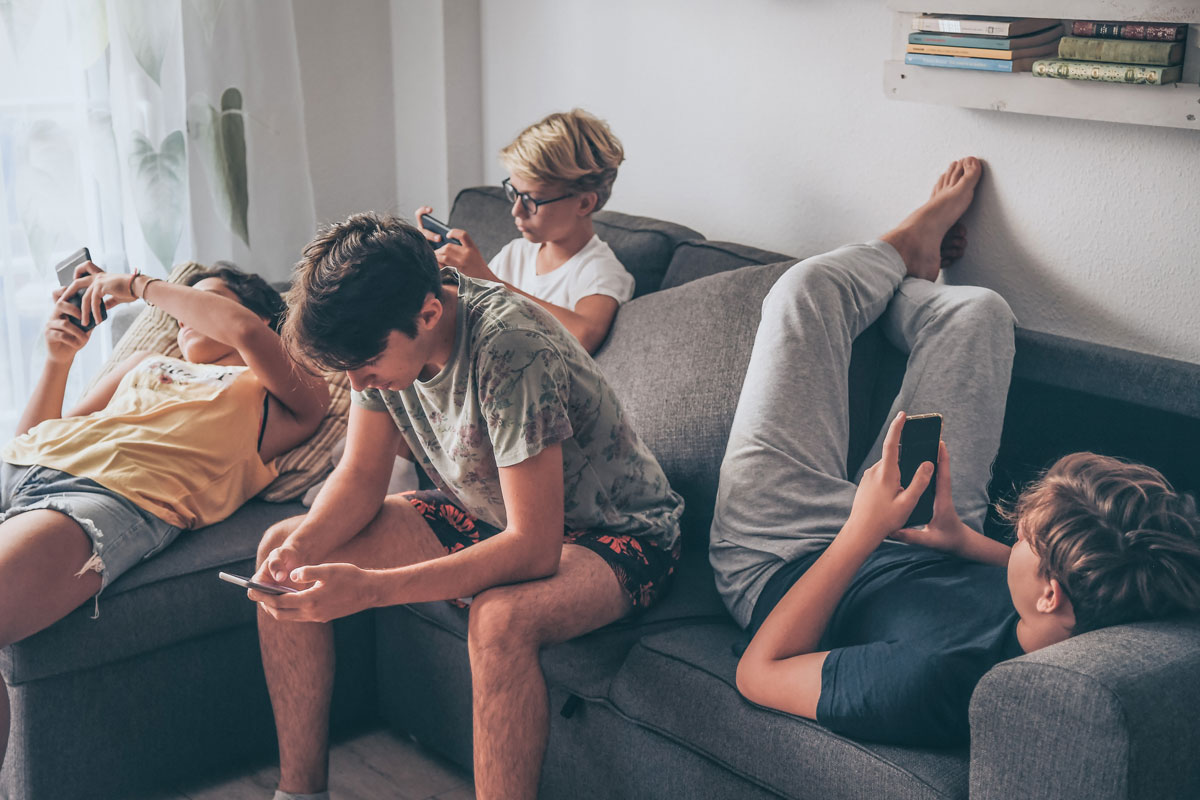

In today’s fast-paced, technology-driven world, smartphones have become indispensable tools for communication, education, and entertainment. However, for teenage boys, excessive smartphone use comes with significant risks that can impact their development, mental health, and academic performance.
At Fork Union Military Academy, we’ve always believed in the benefits of a screen-free campus. While other boarding schools are only now recognizing the value of reducing cell phone use, we have consistently upheld this policy, fostering a space where students can excel academically, build meaningful relationships, and embrace the present moment.
By eliminating cell phone use, we empower our students to strengthen interpersonal skills, prioritize well-being, and achieve academic success without the constant pull of digital distractions.

Adolescence is a critical period of brain development, marked by rapid growth in areas such as the prefrontal cortex, which is responsible for decision-making, impulse control, and emotional regulation. Research published in Frontiers in Psychiatry shows that the constant stimulation provided by smartphones—notifications, social media updates, and instant access to entertainment—can overstimulate the brain, impairing its natural growth processes. This overstimulation can lead to difficulty concentrating, reduced problem-solving ability, and poor decision-making.
Moreover, excessive smartphone use often disrupts sleep patterns, as blue light emitted by screens suppresses melatonin production, delaying sleep onset.
Sleep is essential for memory consolidation and cognitive development, and its disruption can have cascading effects on academic performance and emotional well-being.
Teenage boys are often drawn to multitasking—texting while studying, scrolling through social media during class, or gaming while completing homework. However, neuroscience debunks the myth that humans are capable of true multitasking. Instead, the brain rapidly switches between tasks, reducing efficiency and increasing errors. Studies show that multitasking can lower IQ scores temporarily and decrease productivity by up to 40%.
In a structured educational setting like Fork Union Military Academy, the ability to focus is paramount. Our unique One Subject Plan emphasizes deep, uninterrupted learning, a method that is undermined by the distractions of smartphones.
By removing these devices from the equation, we create an environment conducive to sustained concentration and academic success.
Smartphones have revolutionized communication, but they’ve also led to a decline in face-to-face interactions. For teenage boys, who are still developing their social skills, this can have long-term consequences. Overreliance on texting and social media limits opportunities to practice verbal and nonverbal communication, such as interpreting tone, body language, and facial expressions.
At Fork Union Military Academy, we prioritize building interpersonal skills through team-based activities, leadership training, and in-person interactions. By eliminating cell phones, we ensure that students engage with their peers and instructors in meaningful ways, fostering strong communication abilities that will serve them throughout their lives.
Social media platforms are often designed to exploit human psychology, encouraging users to seek validation through likes, comments, and shares. For teenage boys, who are already navigating the challenges of self-identity and peer acceptance, this can be particularly harmful. Studies have linked social media use to increased rates of anxiety, depression, and low self-esteem, as teens compare their lives to curated, idealized versions presented by others.
The problem is exacerbated by cyberbullying, a pervasive issue on social media platforms. Victims of cyberbullying are at a higher risk of developing mental health issues, including suicidal ideation.
By removing smartphones from students’ daily lives, Fork Union Military Academy creates a safer environment where boys can develop their self-worth based on real-life accomplishments rather than virtual validation.
The correlation between excessive smartphone use and mental health problems is well-documented. A 2017 study published in Clinical Psychological Science found that teens who spend more time on smartphones are more likely to experience depressive symptoms and suicidal ideation. This is attributed to factors such as social media-induced stress, reduced face-to-face interactions, and sleep deprivation.
Teenage boys, in particular, may be less likely to seek help for mental health issues due to societal expectations around masculinity.
At Fork Union Military Academy, we foster a supportive community where students can discuss their challenges openly, free from the additional pressures of online interactions.
Smartphones provide easy access to information, which can be a double-edged sword. While they are valuable educational tools, they also facilitate academic dishonesty. Teenagers can use their devices to search for answers during tests, plagiarize essays, or collaborate inappropriately on assignments.
By prohibiting cell phones, Fork Union Military Academy upholds a culture of integrity. Our students learn the value of hard work, original thought, and ethical behavior, preparing them for the challenges of higher education and professional life.
Prolonged screen time is associated with sedentary behavior, which can lead to obesity and related health problems. It can also cause eye strain, headaches, and repetitive strain injuries.
Many smartphone apps are designed to be addictive, utilizing techniques such as variable rewards and infinite scrolling. For teenage boys, this can lead to compulsive use, reducing time spent on physical activities, hobbies, and in-person relationships.
Teens are often unaware of the long-term implications of sharing personal information online. Cybersecurity threats and exposure to inappropriate content are significant concerns for this age group.
Boarding schools like Fork Union Military Academy are uniquely positioned to address the dangers of smartphone overuse. By eliminating cell phone use, we create an environment where students can focus on their studies, develop interpersonal skills, and engage fully in extracurricular activities. This policy also aligns with our commitment to fostering discipline, accountability, and resilience in our cadets.
In place of smartphones, we provide structured opportunities for technology use, such as supervised computer labs and designated times for contacting family. This balanced approach ensures that students reap the benefits of technology without falling victim to its pitfalls.
Smartphones are powerful tools, but their overuse poses serious risks to the development, mental health, and academic integrity of teenage boys.
At Fork Union Military Academy, our cell phone policy reflects our commitment to creating a safe, disciplined, and focused learning environment. By limiting screen time and encouraging real-world interactions, we empower our students to thrive academically, socially, and emotionally.
For parents and educators, the message is clear: setting boundaries around smartphone use is not just beneficial—it’s essential. Together, we can guide the next generation toward a healthier, more balanced relationship with technology.

Dan Thompson has been with Fork Union Military Academy since 2004, specializing in strategic communications and marketing. He enjoys sharing the success stories of the school and its cadets.
Connect with Dan on LinkedIn